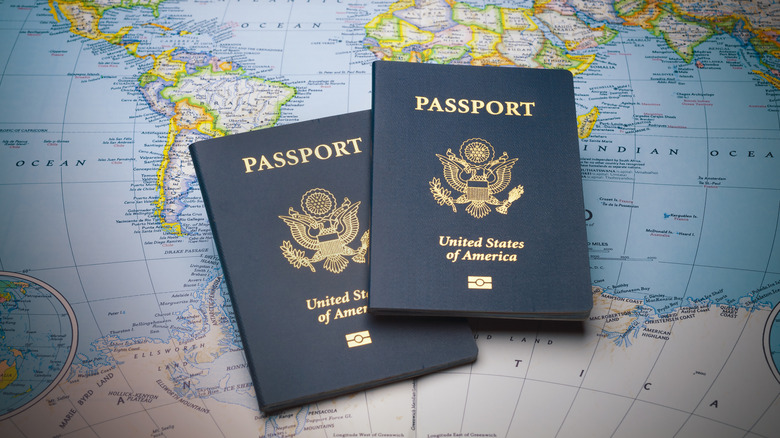Do Americans Need A Visa To Travel To Europe?
If the Instagram stories of your friends posing by Rome's famous Trevi Fountain every summer aren't enough of an indication, Americans love going to Europe — a lot. In fact, they love it so much that according to the European Commission, U.S. visitors topped the list in 2016, spending a whopping 74 million nights at EU accommodations in that year alone. And you can bet that number has skyrocketed since then. But really, who can blame them? Europe's got the charm, the history, and, thanks to budget airlines, a price tag that doesn't require selling a kidney. Most importantly, Americans have also enjoyed the perk of visa-free travel across most of the continent. The good news? That isn't set to change, even with the European Travel Information and Authorization System (ETIAS) coming into play.
As of this writing, American passport holders can enter a total of 188 countries without needing a visa, and that includes nations within the European Union (EU). So whether you're exploring Europe's best canals or going on a Rick Steves-approved scenic train ride, it's been smooth sailing for U.S. travelers. But, of course, Europe couldn't let us have it that easy forever. With ETIAS, a travel authorization system that is slated to be implemented sometime in 2025, there's going to be a tiny new hoop to jump through before you step foot on European soil. It's not a full-blown visa, but yes, you'll have to apply — and cough up a few bucks — for your future Euro trips.
To be clear, ETIAS is not a visa
While there will be an additional hurdle required to get into an EU country as opposed to just waltzing in whenever you please, applying for an ETIAS is far less cumbersome than a traditional visa application — mainly because it's not a visa at all. The ETIAS website explicitly states, "ETIAS is not a visa ... An ETIAS travel [authorization] only allows travellers to enter and remain on the territory of the European countries requiring ETIAS for a short-term stay (up to 90 days in any 180-day period). It does not give the applicants the right to study, work or remain on the territory long-term."
ETIAS works much like the Electronic Travel Authority (ETA) systems in countries like South Korea, Canada, and Australia, which charge between $5 and $15 and allow tourists to stay for up to 90 days. The U.S. also has the Electronic System for Travel Authorization (ESTA), which operates in a similar way. According to a European Parliament briefing, ETIAS will enhance security across 30 countries in the EU, with the exception of Ireland, along with four associated states. Its primary purpose is to perform background checks on visa-exempt visitors, tapping into EU and Interpol databases, as well as a dedicated ETIAS watchlist.
The application fee is a modest €7 (about $8), and if approved, your ETIAS is valid for up to three years or until you renew your passport. So, once it's sorted, you can travel in and out of the EU as often as you like during that period.
ETIAS authorization will be required starting 2025
Although the ETIAS has been in the pipeline since 2016, its official implementation has faced multiple delays, and as of this writing, it's projected for 2025. There's still no exact date, with European Commission Spokesperson Christian Wigand telling Euronews Travel that it hinges on the implementation of the EU's Entry/Exit System (EES), which has also faced delays. "The roadmap for the delivery of the new IT architecture foresees that the Entry/Exit system will be ready to enter into operation in autumn 2024 and that ETIAS will be ready to enter into operation in spring 2025," he noted. "The exact date will be determined by the European Commission and announced on the EES official website well in time for the start of operations. At the moment we do not have a date to communicate."
When ETIAS finally goes live, around 1.4 billion people who currently travel visa-free to Europe will be required to apply. But don't worry, as the process is hardly a hassle. Unlike a typical visa, there's no need for biometric scans or queuing at a consulate, and everything's done online. Simply head to the ETIAS website or app, pay the fee, and hand over basic details like your passport info, occupation, education, any criminal history, and travel plans. The EU says approvals typically come "within minutes," though it could take a few days or even weeks in some cases. And yes, you could be denied. It's always best to get your ETIAS sorted before you start booking flights and accommodations — just in case.


